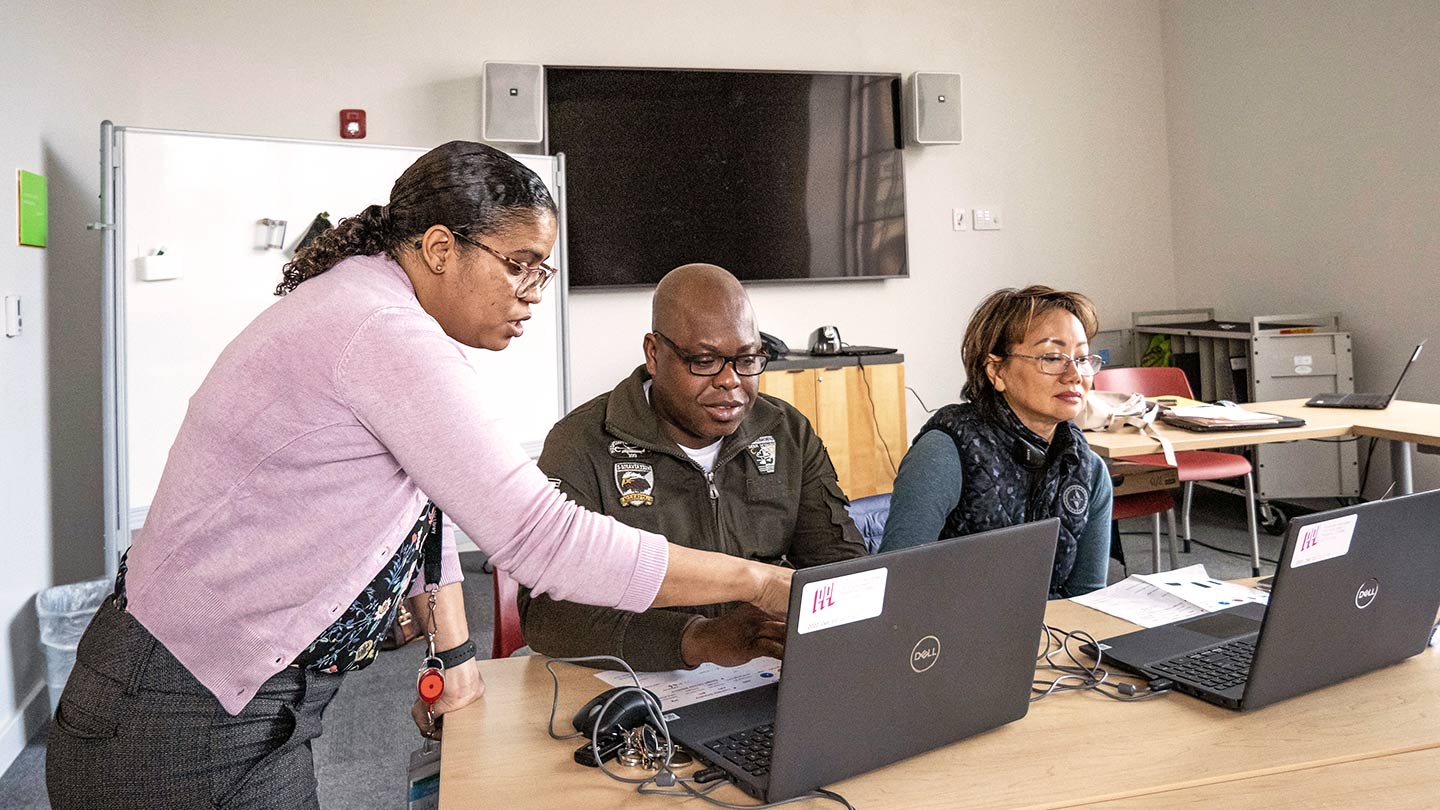For Companies and Institutions
-
Commercial Banking
We provide credit, financing, treasury and payment solutions to help your business succeed. We also offer best-in-class commercial real estate services for investors and developers.
-
Global Corporate Banking
We help clients achieve their long-term strategic goals through financing, liquidity, payments, risk management and investment banking solutions.
-
Investment Banking
Providing investment banking solutions, including M&A, capital raising and risk management, for a broad range of corporations, institutions and governments.
-
Institutional Investing
We support the entire investment cycle with market-leading research, asset management, analytics, execution, and investor services.
-
Payments
Your partner for commerce, receivables, cross-currency, working capital, blockchain, liquidity and more.
Key Links
For Individuals
-
Wealth Management
With J.P. Morgan Wealth Management, you can invest on your own or work with an advisor to design a personalized investment strategy. We have opportunities for every investor.
-
Private Bank
A uniquely elevated private banking experience shaped around you.
Explore a variety of insights.
Key Links
Insights by Topic
Explore a variety of insights organized by different topics.
Key Links
Insights by Type
Explore a variety of insights organized by different types of content and media.
Key Links
We aim to be the most respected financial services firm in the world, serving corporations and individuals in more than 100 countries.
Key Links
- Insights
- Real Estate
- Commercial Real Estate
- Tammy Jones on Building a More Diverse Commercial Real Estate Pipeline
Chad:
Welcome to our Real Estate Speaker Series. We are incredibly excited to have the industry's most seasoned, most exciting, most industry changing veterans here to talk to you today. Today we're excited because we have a good friend of mine. I serve on a board with Tammy. I've gotten to know Tammy, and Tammy is someone that you should know as well. It's Tammy Jones from Basis Investment Group. We're going to have a great discussion around her life, around her career, around her business, and we'll share it with you.
Chad:
Tammy, thank you for being here.
Tammy Jones:
Of course. Well, thank you for having me. I'm super excited to kick off 2021 with you. Feeling better about this year. I know we've all been through a lot in 2020. It's always a pleasure, and so I'm excited.
Chad:
All right, Tammy, we're not hop right into it. We're going to start with who you are. Tammy, tell us where you grew up and tell us what led you to Basis Investment Group.
Tammy Jones:
I am a New York City girl through and through. I was born and raised in South Jamaica, Queens. I come from humble beginnings. I grew up in a two bedroom apartment with eight people, and I often wonder how the heck did we all fit into that small space. First woman in my family to go to college. What's so interesting is my family never owned a home, and so when I think about me diving in and getting into the commercial real estate field, it really was by happenstance. I think when I look back, as you know, Chad, I'm very focused on making sure that there's access to opportunity for women and minorities in commercial real estate, so I'm sure that that has something to do with how I got into it.
Tammy Jones:
I went to Cornell University. Like many of you probably who went to college and didn't exactly know what you wanted to do, I was one of those people, I went into a financial management development training program with a company called Equitable. You guys may remember Equitable Life. Equitable had an investment banking arm, they had a life company arm, and then they had this subsidiary that was this thing called commercial real estate. I really had no idea what it was. I decided to take that rotational opportunity that actually took me to the South in Atlanta, Georgia and the rest is history.
Chad:
Let's unpack that just a little bit more. What was it specifically about real estate that got you so excited?
Tammy Jones:
First of all, real estate is tangible. You can see the investments. You can kick them. You can touch them. I love the fact that I could bring my common sense to understanding neighborhoods and what drives demand. Growing up in the inner city, I had a sense for community and what was different. So if I'm investing today as a leader in the industry, I'm not afraid to go into markets where there may be a majority minority because I know having grown up in workforce and affordable housing that even though we were serial renters, we still had a sense of community and a sense of wanting to stay and make our communities better. I think all of that is super interesting.
Tammy Jones:
I majored in economics and real estate helped me to use some of my supply and demand foundation. I knew I wasn't going to become an economist, Chad. I think real estate is one of those investments that was just easier for me to actually understand, if that makes sense.
Chad:
I love it. You're such a special person because you went from Jamaica, Queens, two bedroom with eight people in it, to Cornell, to gain a great job. How did you decide to cross over and become an entrepreneur? Most people are satisfied with the job, but Tammy, not you.
Tammy Jones:
I love that question because it was really two reasons.
Tammy Jones:
One, I'll just say to folks who are thinking about entrepreneurship, it is not for the faint of heart. You have to have that entrepreneurial spirit. For me, I always had that entrepreneurial spirit. Some of my bosses, my former CEO, would often tell me that I wanted to do things my way, and that is true. I wanted to build things. I love challenge and unpacking and building a process. I love building platforms. When I was working in the institutions, I went from managing a team, to a group, to actually building a platform. That's great training to become an entrepreneur because all of that is necessary.
Tammy Jones:
The second reason was I never saw anyone in the C-suite that looked like me or on the boards of firms that I was interested in in being a part of, and so that was a driver because I wanted to be the change that I wanted to see. I knew that for me to create a pathway and to show people that if Tammy Jones can do this, you can do this that was ... another driver for me was I knew that to be a CEO, likely it was going to mean me going out and creating that role for myself.
Chad:
Tammy, let's double click more on the business. You've done an amazing job building Basis. Tell us more about the composition of the business and how you see the market today.
Tammy Jones:
First of all, if you think about Basis, I want you to think about three main areas that we focus on. The first, as you said, Chad, is on the credit side and it's our funds management platform where we invest in Lund Capital for some of the largest public pension plans, sovereigns and family offices in the country. The second part of the business is our agency business, where we are the only minority and women owned seller servicer with Freddie Mac. I mentioned that I'm super bullish on workforce housing. We can talk a little bit more about that later. The final area of business for Basis is on the commercial real estate equity side.
Tammy Jones:
Really the approach is to be able to invest and lend across the capital stack, which is really important to be able to pick targeted positions, to achieve the best risk adjusted returns from our investors, and then also to be able to focus in the middle market where we believe that there is a tremendous amount of opportunity.
Tammy Jones:
I mean, let's look at what's happened in COVID. Now, I am in New York City girl, and I believe in the city and I believe it will come back, but if you think about where the migration is going; it's going South and West into places like the middle market. Basis has been there for over a decade plus. I see a lot of people beginning to try to invest there, but as you know, the middle market is really about relationships, and it takes time to establish those relationships. I think that our competitive advantage honestly, is to be one-stop shopping, where we can do debt, senior debt, mezz debt, preferred equity, common equity, and really become a relationship lenders.
Tammy Jones:
I'm excited about where we are. I started Basis in the great financial crisis, so you know that I'm one that leans in when others may be afraid. I actually think that with this cycle, there will be opportunities. I think that I'm encouraged by 2021. Why? Because I feel like we're closer to normalcy than we are further away from it. I think it's going to take time with consumer behavior, with how we roll out the vaccine. I think that there are going to be opportunities in the real estate market. We're looking at stuff like, and I'm sure you guys are as well, life sciences, data centers, definitely industrial property, even cold storage. I told you about multifamily and our thesis there. And then hotels; we think that they will come back. There was an exogenous factor that caused what is going on as we all know, but I do think that there will be opportunities.
Tammy Jones:
So we're excited because we are going to be all over the capital stack, being able to find those solid investments.
Chad:
Talk about why you wanted to focus up and down the capital stack and why you wanted to focus on different property types.
Tammy Jones:
For us, we do three things for our investors.
Tammy Jones:
One, diversification, and that is in our fund across property type, across real estate life cycle, across position in the capital stack, across geography. That, we believe, is a significant mitigate to risk.
Tammy Jones:
The second thing in our fund is we have a strong focus on current income. In volatility, current income is your friend and mitigates risk for returning capital.
Tammy Jones:
The final thing is that if you can get equity-like yields but actually have the downside and defensive positioning of debt, in today's market it makes a lot of sense.
Tammy Jones:
That's what we offer. I do think that there's certainly a compliment ... there are some platforms that focus on one thing, but I think in this market, I'm happy that we weren't just in bridge debt or just in CMBS B-pieces or just in preferred and mezz, because I think that it allows us to be nimble and opportunistic.
Chad:
It hits me just listening to what you said, you're focused on downside protection. You're focused on recurring cashflow. You're focused on thinking about risk. Tell me where you got that framework from? Is that from earlier in your career that you decided, "Hey look, I'd better focus on the downside here." I love your arbitrage of having debt-like risk parameters, but you're driving equity like returns. I'd love for you just to comment on that.
Tammy Jones:
I mentioned before that foundation is important. I've been credit trained with many large institutional players and platforms. I think that finding and building a team that also thinks the same way, that many of us have debt and equity experience. The one thing I'm super proud of, I'll just slide this in here, is that 78% of my team is comprised of women and minorities because I'm a big believer in diversity of thought. I think the institutional training, understanding how to build a business.
Tammy Jones:
That's the other piece of advice that I will give is some people will go and hang a shingle because they have pipeline and relationships. That's key, but it's not the only thing. You actually have to know how to build a business. That's what Basis is. It's starting from scratch; building the team, setting forth the policies and procedures and the infrastructure and all of those things. When I counsel other managers, because I want other people to go into this business, particularly diverse managers, I always say make sure that you spend time on understanding when an investment comes in, what are you going to do? How are you going to underwrite it? What are the controls in place? Because that's what this institutional capital that we're managing money for requires. You have to have reporting.
Tammy Jones:
Chad, you know all this through banking regulation. It's similar in the public pension plan world. Managing money for large institutions, there's a certain level of professionalism, level of reporting and back office support that you have to have. That's the place that I see many people not understand how important it is to build that infrastructure.
Chad:
You mentioned diversity a number of times. Can you please help us as an industry, understand what we can do to help more women and more diverse firms succeed in the industry?
Tammy Jones:
The biggest challenge that we face day in and day out is access to capital and credit. That is it. When I think about the challenge that I had ... even when I talked about my background and I had this great attribution record, I did well at every one of the platforms and I was able to move to a certain level, but I literally almost started all over when I launched Basis from the standpoint of having to build my own track record. I think that partners like banks and other larger platforms to be able to just think about how important it is. What drives the US economy? Small businesses. How do we close the wealth gap?
Tammy Jones:
I think about the wealth gap, and I'll just tell you an African-American family has 17,000 based on the Federal Reserve most recent report, versus a Caucasian family at 171,000. What the main driver and the differential on those balance sheets is real estate. I believe that our industry, we, have a great opportunity to try to close the wealth gap by helping smaller women and minority owned firms, partnering with them.
Tammy Jones:
Ask yourself as a larger platform when you have a GP partner out there, do I have any women or diverse businesses? Study after study shows that diverse teams produce better outcomes. And if you don't buy that, there's at least a study that shows it's not any worse. So there should be no reason that 98.7% of the global AUM that's managed by investment managers is white owned firms, white male owned firms.
Tammy Jones:
We have to do a better job. I'm always using my platforms, and I appreciate this one, to drive that point home. Partnership is key. Mentorship is key. Access to capital is key.
Chad:
What's your predictions for 2021? What do you think? What's the outlook for the market? What are you most excited about?
Tammy Jones:
I think that 2021, as I mentioned previously, is going to still be a year of volatility. However, I do think that we're moving closer towards coming back into what I'll call more normal times. I do think we have to be patient as investors and as lenders. I think that we have to make sure that we are watching migration because consumer behavior, that hasn't completely stabilized, so we don't know exactly what's going to happen once we're all back traveling. I do think that that office and the remote working has transformed how we're going to use office in the future. I don't think that office is completely not going to come back, but I do think that many firms, including Basis, we'll look at sort of a hybrid model. I think that's going to affect space utilization. So we have to be mindful of that.
Tammy Jones:
I'm excited about multifamily. Like I said, I do think that since we have an affordability crisis in America in housing, there's a tremendous opportunity for adaptive reuse of other property types that may be now overbuilt, like maybe some office will be converted to some multifamily. I'm excited about just getting back into investing in hotels, which Basis has done, because I do think that there will be tremendous opportunities. In challenge, there are always opportunities.
Tammy Jones:
I believe that 2021 will reveal ... where buyers and sellers would begin to say, "Okay, it's time to actually transact," because 2020 has been a little bit of a pause. I think that 2021 will bring us more towards more deal activity. That's what we're hoping for. With fund too, we're excited about having even more dry powder to invest.
Chad:
We are so excited that you spent time with us. You're an inspiration to us all. We're excited for all of you to get to know Tammy just a little bit better. Thank you all.
Chad Tredway, Head of Real Estate Banking, kicked off our Changemakers You Should Know series with Tammy Jones, a 25-year industry veteran. Jones is the co-founder and CEO of Basis Investment Group, which has closed roughly $4 billion in debt and structured equity across the U.S.
During their discussion, Tredway and Jones covered many topics, including:
- Humble beginnings: Jones grew up in a two-bedroom apartment in South Jamaica, Queens with her family of eight. She attended Cornell University and was the first woman in her family to graduate from college. “My family never owned a home,” Jones said. “So when I think about me diving in and getting into commercial real estate, it really was by happenstance.”
- Co-founding Basis Investment Group: Jones has always had an entrepreneurial spirit and loves building processes and platforms. But she couldn’t imagine herself in the C-suite or on the boards of firms. “I never saw anyone who looked like me,” she said.
- Building a more diverse talent pipeline: “I’m really focused on making sure there’s access to opportunities for women and minorities in commercial real estate,” Jones said. She’s proud that 78 percent of her team members at Basis are part of those underrepresented groups.
- How others can help women and diverse firms succeed: Jones is one of the few Black female CEOs in multifamily commercial real estate. “I don’t want to be the only one,” she said. Jones advocates for increased mentorships, partnerships and access to credit for women and minorities in the industry. She also emphasizes diversity in the board room.
- “In challenges, there are always opportunities”: Jones sees commercial real estate moving closer to normalcy in 2021 and emphasized patience for investors and lenders. She’s keeping an eye on migration to the South and West U.S. and looking at options in life sciences, distribution centers and cold storage. Jones is also eager to see the adaptive reuse of properties—especially into affordable housing—and how we use office spaces when employees return to the workplace after the pandemic.
Related insights

Real Estate
Dec 04, 2025
Learn from JPMorgan Chase commercial real estate leaders and stay up to date on the latest industry news and media coverage.

Real Estate
FHFA’s 2026 multifamily volume caps signal strong activity
Dec 02, 2025
The Federal Housing Finance Agency increased agency multifamily loan purchase caps for 2026. It’s a positive sign for financing availability and market activity.

Real Estate
Why CAM charges are important for property managers
Dec 02, 2025
Shared building spaces impact tenants’ satisfaction and the success of your commercial properties. Find out more about the costs to maintain these areas.

2:29 - Real Estate
If these walls could talk: Seattle
Nov 03, 2025
We’ve invested more than $630 million in Seattle affordable housing and community services over the past decade. Discover Community Development Banking’s local impact.

Real Estate
Helping Guardian Real Estate Services grow its impact
Oct 23, 2025
See how J.P. Morgan’s comprehensive banking solutions helped this multifamily developer and manager grow from a regional leader to national scale—including a $497 million milestone deal.

Real Estate
Why your bank’s onboarding and service teams matter
Oct 06, 2025
Understand the role onboarding and service teams play, and how industry expertise can support commercial real estate success.

Real Estate
Investing in libraries, beyond the books
Oct 02, 2025
Investment helps libraries take on a larger community role, offering services like workforce development, technology classes, homework help and more.

Real Estate
How landlords can prepare for natural disasters
Oct 02, 2025
Severe weather events are on the rise. A business resiliency plan can help commercial real estate owners and operators prepare to minimize the impact on renters and properties.
You're now leaving J.P. Morgan
J.P. Morgan’s website and/or mobile terms, privacy and security policies don’t apply to the site or app you're about to visit. Please review its terms, privacy and security policies to see how they apply to you. J.P. Morgan isn’t responsible for (and doesn’t provide) any products, services or content at this third-party site or app, except for products and services that explicitly carry the J.P. Morgan name.